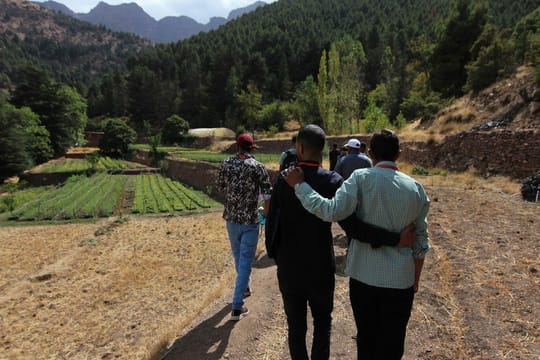Managing water for climate adaptation and mitigation

By Timo Reinitzer, HAF intern

What is the proper response to climate change? We all know that climate change is going to have an immense impact on our ecosystem, especially on water distribution. The question is rather what those will be and how to migite them. Africa will particularly face severe water shortages. As Professor Kehinde Ogunjobi states in the webinar “Managing water for climate adaptation and mitigation“ by the CGIAR Research Program, “The IPCC report predicts consistent robust warming over most parts of Africa, the largest increase will be in north Africa and Sahara regions (5.6°C) (…) those regions will also experience a decrease of rainfall to up to 20%.”
This uncertainty in rain patterns and their intensity will have a great impact on both seasonal and permanent water sources, reduce river flow (such as the Nile River, the Niger River Basin, or the Volta Basin) and increase drought occurrence. Thus, Africa will face rising health problems, transboundary conflicts, and an increase in food insecurity. As a result of those extremes, precautionary measures are needed to mitigate increased heat stress. Africa’s agriculture ought to adapt to outbreaks of infectious diseases and a reduction in productivity. Farmers may need to redistribute grazing spaces and use drought-tolerant crop varieties. Furthermore, due to the rise in the scarcity of water, transboundary water sources demand peaceful communication between countries. Their enduring exploitation could become a relevant issue for future conflicts.
Sander Zwart who works for the International Water Management Institute (IWMI) explains that operational adaption must include co-implementation, stakeholder engagement at all decisions. Their needs need to be identified and then continue to be included in research and innovation before they can be tackled. Possible measures are digging wells, farmer-led landscape water planning, and water conservation. Professor Ogunjobi stresses that gender equality, nature-based solutions (indigenous knowledge), and the nexus approach (the interlinkage between all sectors) always need to be at the forefront of our approaches. In addition, he adds that global funds are crucial for human development in rural areas. There are multiple ways to implement those aspects. As an example, the Thematic Expert on Water of the Dutch Embassy in Rwanda, Timmo Gaasbeek, introduces the PIP (plan intégré du paysan), which was developed by Dr. Aad Kessler and focuses on encouraging farmer families to identify their needs and envision their future. Instead of having an imperialistic perspective by telling the community what to change, they rely on farmer training and empowerment.
The path the High Atlas Foundation (HAF) follows is also a participatory approach. HAF supports Moroccan communities to take action in implementing human development initiatives. At first, a women’s empowerment workshop is held that aims to include everyone in the decision-making process. The next steps are geographic mapping, social mapping and dream mapping. What resources does the community have to build on? What do they need? What do they dream of? The High Atlas Foundation aims to sustainably influence the community by planting organic fruit trees, providing renewable energy resources, providing clean drinking water, etc. “HAF’s vision is, in essence, Morocco’s vision for itself. It is public-private collaboration at all levels of society to assist villages and neighborhoods in furthering their self-reliant development.” (Dr. Yossef Ben-Meir, President of the High Atlas Foundation)
Resources:
CGIAR Research Program on Water, Land and Ecosystems Invitation